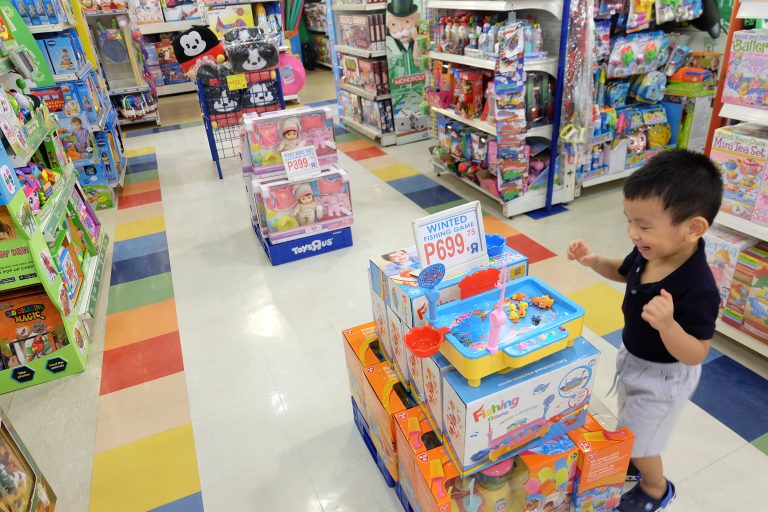One thing that has always stuck to me about parenting is, “if you don’t teach your kids about —-, someone else will.”
There are so many values and attitudes (both positive and negative) involving money. Think about the money traps that our kids can fall into – irresponsibility, entitlement, greed, materialism, etc.
As early as now, we want to be intentional about how we teach our children about money and the positive values that can be attached to it:
1. Diligence
My husband and I let our son, Mati, put all our loose change in his piggy bank. Hannah, our daughter, sometimes stuffs coins into her mouth when she thinks we’re not looking, but we’re getting there.
I plan to change our piggy banks to a clear glass jar so that our kids can see how diligence pays off. When they see the coins piling up, they can get excited towards reaching a goal. I’ll put lines on the jar, much like a height chart for kids, so that they can track their progress and celebrate small wins.
2. Wants Vs Needs

What kind of kid doesn’t love toys? When Mati was about under 2 years old, he would treat the toy store like a museum. He would look, touch and play with some toys, then wave goodbye when it’s time to leave.
Then he got smarter hehe. Now he’ll declare confidently, “Mama, I want this! Pleaseeeee!”
Even with the cutest face he could muster, we’d say no… No because he already had versions of those at home. Or he has enough toys. Or sometimes just to let him practice hearing no.
Even if they don’t understand it fully yet, we want Mati and Hannah to learn that their parents will give everything all they need, but not everything they want.
Why so “mean”?
Because Mati and Hannah will inevitably not get everything they want. My kids, like all kids, will eventually face rejection and they must have the emotional bandwidth to accept it graciously. I see so many kids nowadays who boss around their yayas (and even their parents), it’s crazy!
Even if Mati is sharp enough to know that we can afford things (he will actually open my bag and exclaim “Mama’s wallet dami money!”), he won’t get everything he wants by whining or crying. Same goes for Hannah.
3. Delayed Gratification

When we were in Hong Kong, Mati enjoyed riding trams. “Single tram!” “Double decker tram!” At the Peak Galleria, he spotted a model tram and played with it and held it lovingly. I bought it without him seeing and told him that Hannah would give him one for his birthday.
Now, whenever he remembers the double decker tram, I just remind him to wait for his birthday. He would just smile and repeat “Hannah gift Mati double decker tram”, smile, and go play something else.
I’m so glad because in this instant world, kids should learn that some things are worth waiting for.
4. Making Choices / Opportunity Cost
While we are more strict when it comes to toys, we don’t limit our kids when it comes to books.
We want our kids to enjoy reading, so we let them choose the books they like. At the bookstore, Mati would bring back two books and I would ask him to just pick one. His brow would furrow and he would look at each one, carefully making a choice.
I enjoy seeing him exercise his freedom to choose. He gets to figure out what he really likes, it trains his brain to make decisions and weigh the costs of choosing one and leaving the other.
5. Sundays = Rest

“Today is Sunday! Daddy no office!” Mati will exclaim gleefully.
Albert works Mondays thru Saturdays, so whenever it’s Sunday, Mati knows it’s our special day to go to church and spend the whole day together having fun. There are times that people would invite Albert for meetings on Sundays, but it’s a non-negotiable thing for our family. Rest is not an outright money attitude, but a value we want to pass on – that we have 6 days to work, then one day to rest and worship.
6. Thank You’s Bring Contentment
Every night before we sleep, we take turns thanking Jesus for things that happened during the day. Mati knows the general thank you’s (our home, his parents, Hannah, our helpers, our car, his toys, his school, his friends, his teachers), and we train him to be specific, like “thank you I went swimming with Hannah, Daddy and Mommy today”.
It’s a great exercise not only for kids, but for adults too! By God’s grace, we can fight the comparison trap of discontentment through thankfulness.
7. Responsible Stewardship

When Mati was younger, we’d pack away his toys for him – it was just faster that way. But now that he’s older, we teach him the consequences of not packing away – things go missing, or get damaged due to being left wherever.
Recently, we bought him a modeling clay baking set, and he didn’t pack away his toys after playing. So he lost the “small purple spoon”. He kept asking for the “small purple spoon”, and it was hard to fight the urge to play hero. We could have easily bought another set (it was just a Miniso set for less than P500), it’s not the lesson that we want to teach. We want to let him learn that God gave us stewardship over things and a good steward takes care of what he has been given.
By and Large
We are soooo not perfect parents and we are learning everyday. These principles we’ve shared above are things we’ve prayed about and discussed as husband and wife. What do we want our kids to be like when they grow up? What attitudes do we see them picking up from us and around them?
The more time we spend with our kids, the more we get to know them and what traits we want to strengthen. It’s easier to give in, but we’d rather show tough love now than try to reel in negative habits and attitudes later on.
Republished with permission from Mom Your Own Business
Also read: 8 Smart ways to help your family save money in 2019
 Money Tips
Money Tips Building a BakuNation
Building a BakuNation Becoming a Parent
Becoming a Parent Ages & Stages
Ages & Stages Parenting
Parenting Health & Wellness
Health & Wellness Education
Education Lifestyle Section
Lifestyle Section Become a VIP
Become a VIP Press Room
Press Room TAP Recommends
TAP Recommends Shopping
Shopping Community
Community Rewards
Rewards VIP Parents
VIP Parents
